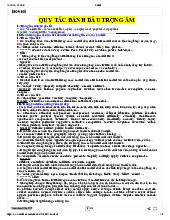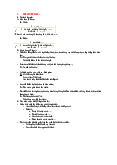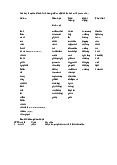









Preview text:
BỘ GIÁO DỤC VÀ ĐÀO TẠO
TRƯỜNG ĐẠI HỌC NGOẠI NGỮ - TIN HỌC TP. HỒ CHÍ MINH
ĐỀ CƯƠNG CHI TIẾT BẰNG TIẾNG ANH
NGÀNH QUẢN TRỊ KINH DOANH
(Áp dụng cho khóa 2023 trở đi) 1
TP. Hồ Chí Minh, tháng ……./2023 1 HO CHI MINH CITY UNIVERSITY
OF FOREIGN LANGUAGES - INFORMATION TECHNOLOGY
FACULTY OF BUSINESS ADMINISTRATION COURSE OUTLINE
(Issued in accordance with the Decision No …../QĐ-ĐNT, … /… /202….
By Ho Chi Minh City University of Foreign Languages - Information Technology) 1. Specifications
COURSE TITLE: Listening 3 Course ID 1410163 Credit hours 02 Instructor names 1. Nguyễn Thái Đức Emails ducnt @huflit.edu.vn 2. Lê Hữu Phước phuoclh@huflit.edu.vn Type of course Full time Mode of delivery Offline and Online (Moodle) Related courses Pre-requisites Listening 2 Total periods 30 Faculty
Faculty of Business Administration Other information Skill teaching 2. Overview
The course offers the knowledge for listening skills in everyday situation such as listening and
guessing the main content, content in details, listening for general gist and details; getting the
ability of listening for the content of conversations in English at the level of Intermmediate;
helping students acquire the ability of note taking on the the content of everyday
conversations in a natural way for their studies and future jobs. Also, Students’ skills of
working in pairs, teams, and positive behaviors of study will be developed to meet their better studies and work. 3. Objectives 2
After finishing the course, students have the ability of getting the tips for different types of
listening to main ideas, sub ideas, and intermediate note-taking; applying the different tips for
listening to decide the necessary information and to comprehend the meaning as well as
content of the listening; therefore, students will be able to do various exercises at the intermediate listening level.
4. Course Learning Outcomes CLO Outcomes PLOs CLO1
-Being able to write down the key words related to the topic after PLO 1-7 listening
- Extracting the gist of the listening
- Differentiating the sounds, the way of pronunciation of words,
and the intonation in a language context. CLO2
Undertanding various topics related to student’s everyday life PLO3,7
such as working, doing business, research on culture, sociology,
psychology, behavioral science, marketing, public heathcare... CLO3
Recognizing the student’s vocabulary related to the everyday life PLO6,8
such as working, doing business, researching on culture,
sociology, psychology, behavioral science, marketing, public heathcare... CLO4
Applying the skills of listening comprehension and taking note in PLO5,6,8
order to get more knowledge of culture, society and economy… CLO5
Promoting creativity and skills of note-taking. PLO8 CLO6
Having he ability of self-supporting, working in groups, PLO6
independent and logical thinking, and well adapting to the environment of studying.
5. Method of Instruction 5.1 Teaching method - Open-ended question - Questions and answers - Explanation - Lecture - Presentation - Team work
5.2 Learning method (suggested):
+ Self- preparation of lessons, reading the materials in advance, conducting independent
research on reference materials… 3
+ Doing homework on Moodle, or assignments assigned by the teacher (Homework assignment) + Classroom collaboration + Inquiry-based learning
6. Textbooks and teaching aids Required textbooks
Table 6.1 Textbooks, other learning materials Publish No Author The title of books Publisher ed year Main Texbook 1 Peg Sarosy & 2017 Lecture ready 1, Oxford University strategies for Kathy Sherak Press academic listening & speaking, 2 edition Reference books 1 Patricia 2014 Listening and note Cengage Learning A.Dunkel taking skills,4th edition, level 1 2 Patricia 2014 Listening and note Cengage Learning A.Dunkel taking skills,4th edition, level 2 Other materials
Table 6.2. List of useful websites 1. Referenc Website link Updating date TNo e conten t 2. Link 1 http://bristish 3. 25/04/2023 4 1 council//learnenglish.org. 4. Link 2
https://elt.oup.com/cat/subjects/sk5. 25/04/2023 2 ills/speaking/?
sortfield=1&cc=vn&selLangu age=en Teaching aids Table 6.3 Teaching facilities Teaching List of main equipment and For lesson/ N institution software chapter o address Equipment, tools, Quantity software,… 1 Single room – computer, Projector, 1 Unit 1 – 8 Maximum speaker, microphone, Main material capacity of white board, whiteboard [1] 45 students marker, paper… Huflit – Campuses: Cao Thắng, Sư Vạn Hạnh, Hóc Môn 7. Assessment Methods
Description of learning outcomes assessment
Students must perform the following tasks:
- Attend at least 80% of theory classes.
- Complete group exercises/exercises. - Attend mid-term test. - Attend the final exam. 5
- The score for the formative assessment and the final exam assessment is scored on a 10-
point scale (from 0 to 10), rounded to 0.5.
- The course score is the sum of the scores for all component assessment of the course
multiplied by the respective weights. Course grade on a 10-point scale rounded to one decimal place.
- Students will be assessed for their cumulative coursework as follows:
+ Attendance score: based on the number of classes attended/total number of periods
+ Score of class assessment: based on class assignments and home assignments
+ Mid-term test score: In-class exam
+ Final exam score: General exam at the end of the semester
Summary of learning outcomes assessment Component Duratio Assessment Weight CLOs s n Sub Weight Schedule Forms Class CLO6 10% 12 weeks Attendance In-class 40% 12 weeks CLO 2-6 Formative activities Assessment 10% Moodle assignment Mid-term test 20% Week 10 CLO1-6 Final test Listening test 60% 60% CLO1- CLO6 Total 100% 8. Learning schedule Week/ Topics Suggested Homework Meeting Reading /Assignment 1 Course Introduction - Take notes - Ask and Answer questions
(learning content, guidance on in-class
and self-study methods, regulations for
in-class and self-study activities, online
learning, timing of mid term and final tests, assessment formats, and evaluation.) 6 2 Chapter 1: The first day in Main - Listen and take social psychology class Textbook notes - Ask and Answer questions - Group discussion - Practice 3 Chapter 2: The pace of a - Listen and take place. notes - Ask and Answer questions - Group discussion - Practice 4 Chapter 2: The pace of a - Listen and take place.(cont.) notes - Ask and Answer questions - Group discussion - Practice 5 Chapter 3: Business - Listen and take innovation notes - Ask and Answer questions - Group discussion - Practice Chapter 3: Business - Listen and take 6 innovation(cont.) notes - Ask and Answer questions - Group discussion - Practice Chapter 4: Global - Listen and take 7 business: the case of MTV notes - Ask and Answer questions - Group discussion - Practice 8 Chapter 4: Global - Listen and take business: the case of MTV notes (cont.) - Ask and Answer 7 questions - Group discussion - Practice 9 Chapter 5: Celebrities and - Listen and take the media notes - Ask and Answer questions - Group discussion - Practice 3rd week - Listen and take Online self- study 1. Learnin notes
g on Chapter 6: Communication - Ask and Answer Moodle revolutions questions - Group discussion - Practice 10 Mid-term Test (expected Listening test date 1st November) 6th week Online self-study 2. - Listen and take Learnin Chapter 7: How sleep notes g on Affects thinking - Ask and Answer Moodle questions - Group discussion - Practice 11 Chapter 5: Celebrities and - Listen and take the media.(cont.) notes - Ask and Answer questions - Group discussion - Practice 9th week Online self –study 3. - Listen and take Learnin notes
g on Chapter 8: The influence of - Ask and Answer Moodle questions geography on culture - Group discussion - Practice 12 REVIEW
-Reviewing the learned knowledge
-Providing guidance for students to 8
review the material for the final exam.
- Addressing questions and announcing the process grades 9. Academic Integrity
Academic integrity is a crucial value that underpins the quality of teaching, learning, and
research at HUFLIT. Learners are expected to adhere to guidelines that include avoiding
plagiarism, working independently on individual assignments, responsibly engaging in group
work, and reporting instances of academic dishonesty. Upholding these principles promotes a
culture of intellectual honesty, integrity, and fairness, contributing to an environment
conducive to excellence in education.




